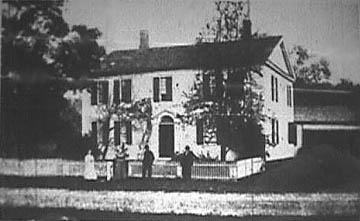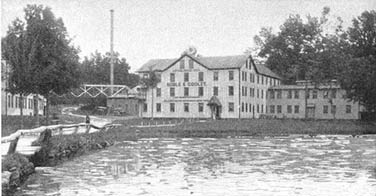
The Spelman House, in front of which the colonists gathered for their departure.
|
"We, the Subscribers, Being a Committee appointed by the Inhabitants of Bedofrd to agree with the Rev. Moses Tuttle with respect to Grain he is to Receive for his Solory for this present year, have accordingly agreed that the Sd Solory be paid in Grain as followeth, that is to say: Wheat at 3 shillings 5 pence per Bushel, Rye at 2 Shillings 4 pence pr. bushel, Indian Corn at 1 shilling 8 pence 2 f. pr. bushel. to the value of thirty Six pounds nineteen shillings and ten pence. As witness our hands.
"PHINEAS PRATT,
"STEPHEN HICKOX, Com'tee.
"MOSES TUTTLE."
Even this small "Solory" was difficult of collection, for the record indicated that in July, 1755, a meeting was held when it was
"Voted, that the Society would Chuse a committee to give Security to Mr. Tuttle of his Attorney for the remainder of money that is his Due."
Another pastor, who served the own for twenty years, was Jedediah Smith, who was a little inclined to be a Stoddardarian in sentiment, this notion gaining strength in this mind until, after man stormy meetings,

The Drum Factory, Granville, Massachusetts.
|
Another clergyman who was famous in the history of Granville was a negro, Lemuel Haynes, who fought his way upward from the lowliest birth, gained an irregular education by persistent industry after the day's work was done, and often, in spite of race prejudice, surprised his acquaintances with utterances of great beauty and spiritual power. Friendly ministers instructed him in Greek and other branches, and after examination by a council he was indorsed for regular pastoral work. In Torrington, Connecticut, and Rutland, Vermont,
— page 101 —